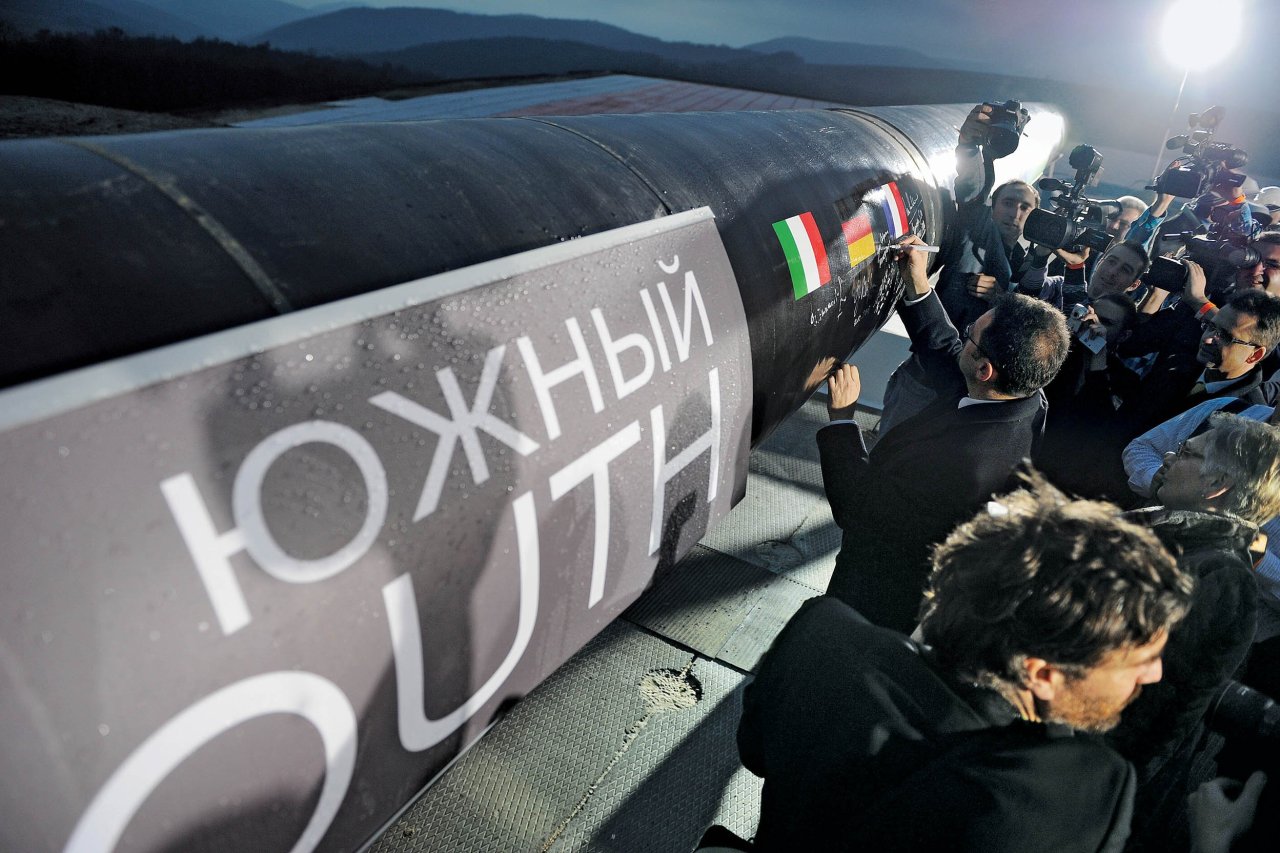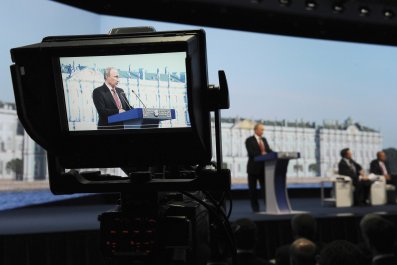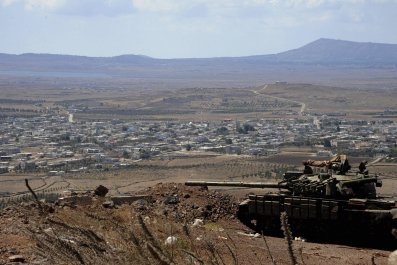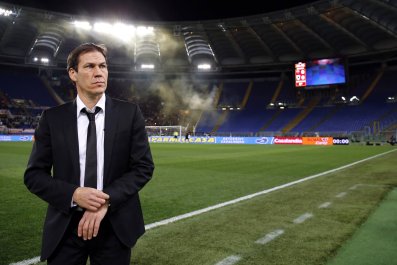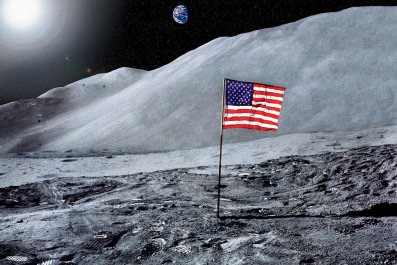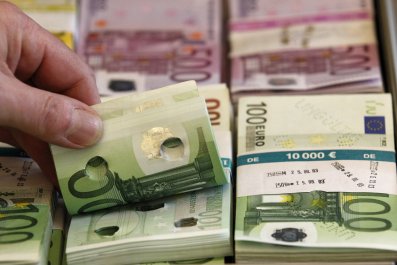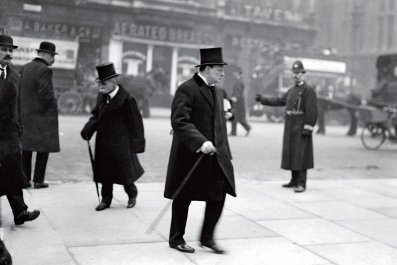In the cornfields of Donbass, Ukraine, the war between the Ukrainian army and Moscow-backed rebels has sputtered to an uneasy stalemate. But as winter approaches, a new battlefront in Moscow's proxy struggle with the West is opening up—and though it will not be as bloody, it could be no less politically dramatic than the recent shooting war.
On the face of it, the battle lines are clear enough. Russia needs the West for loans, financial services, foodstuffs and technical expertise—all of which are being choked off by economic sanctions over the Kremlin's intervention in Ukraine. Europe, for its part, relies on Gazprom, Russia's majority-state-owned gas giant, for up to a third of its gas—and about half of that is piped through Ukraine. Should the Kremlin decide to use its gas supply to hit back against European sanctions, the stage is set for the mother of all gas wars.
The Kremlin "firmly believes that [gas] is our last and our best weapon, the one Europe fears the most," says one Kremlin pool reporter, citing private conversations he has had over recent weeks with top officials. "They say: 'Just wait till the first snows fall, and we'll see what Europe says about sanctions then.'"
Superficially, Russia indeed seems to be holding all the trump cards. Support for Vladimir Putin's rule still rides high at over 80 percent despite Western sanctions that have crashed the ruble, sent inflation soaring and cut off crucial funding to many of Russia's main industries and banks. Even sanctions from the Russian side banning imports of all European and U.S. foodstuffs haven't dented Russians' patriotic fervor.
Europe is a different story. A sustained gas cutoff would have an immediate and dramatic effect. "People in democracies notice their energy bills. They will not tolerate power cuts. Clearly, [Western] politicians have to take account of this," says one senior Western diplomat with knowledge of the European Union's internal debates on sanctions. "This is why, for the time being, we do not touch Gazprom." Whereas almost all Russian state-owned oil companies and major banks have been cut off from borrowing money on international capital markets, Gazprom has been, so far, exempt from sanctions.
But while the Kremlin may consider leaving Europe shivering, doing so could damage Russia just as much as it hurts its newfound adversaries in the European Union.
The first reason is technical. A gas well is like a pressurized bubble deep in the surface of the earth, usually trapped under a dome of impervious rock and under huge pressure. Drill down into it and the gas emerges on its own—indeed one of the main challenges of opening new gas fields is controlling the enormous pressure of the escaping gas. In other words, says former Gazprom consultant Lev Smirnov, "you can't just shut off a gas well without inflicting serious damage." You can get rid of some gas by just flaring it off at the source, but even disregarding the environmental consequences, even the smallest wells still produce far too much gas to safely flare it all," says Smirnov. Nor can significant volumes of gas be easily stored. Over recent years, Gazprom has built underground storage facilities in salt caverns, in so-called water-bearing structures that trap the gas in natural domes of rock, and in depleted gas wells. But at best all that storage capacity—which essentially entails expensively pumping the gas back into the ground—can hold only a few days of Gazprom's production.
But Gazprom's biggest vulnerability is financial. In theory, the company is still one of the few Russian majors with access to international finance. In practice, says oil and gas project-finance consultant Bruce James, "lenders are very nervous about Tier Three"—a threatened next round of sanctions—"and Gazprom is finding it almost as hard as the other [sanctioned] Russian companies to raise capital." That matters a lot, because Gazprom's overheads are a massive $25 billion a year, including investment needed to maintain current output levels from flagging fields. The company also needs to service $50 billion in current debt, as well as pay for the development of new Arctic fields, build new pipelines and gas liquefaction plants in the Pacific and the Baltic, and construct a giant new pipeline to China, due to come online in 2019. Without international bank loans, the company only has its day-to-day cash flow to rely on—60 percent of which, or $65 billion, comes from sales to Europe. True, Putin inked a major agreement with Beijing in May to supply $400 billion worth of gas over the next 30 years. But an agreed prepayment from China for $25 billion has not yet materialized. For the foreseeable future, says the Western diplomat, "Gazprom needs its European customers just as much, if not more, than we need Gazprom."
So a truce just as fragile as the one in place on the ground in Ukraine pertains between Gazprom and its European customers. "They're trying to pretend that it's business as usual," says Smirnov.
The wild card, though, is Ukraine itself.
All previous Russian gas cutoffs—and there have been four since 1995—have centered on an ongoing dispute over gas prices and transit fees paid by Kiev, and pitted Gazprom against various Ukrainian governments controlled by see-sawing pro- and anti-Moscow factions. Now, after this year's bloody war that left over 3,000 dead and saw Crimea annexed by Russia, the electoral arithmetic of Ukraine has changed forever. Without the Russian-speaking population of Crimea, a pro-Moscow administration will never be elected in Kiev. And, more importantly, the war has fostered such powerful anti-Russian—and by extension anti-Gazprom—sentiments that the chances of Kiev paying the more than $5 billion in arrears that Gazprom claims are clearly nil.
As a result, Gazprom already technically suspended gas shipments to Ukraine in June—but continued pumping gas through Ukrainian pipes for European customers downstream. Few in the energy industry doubt that the Ukrainians have been helping themselves to gas from that Europe-bound supply, despite Russian protests that millions of dollars are being illegally siphoned off into the Ukrainian system. The situation is complicated even further by the fact that some Gazprom customers sympathetic to Ukraine—notably Poland and Slovakia—are officially pumping some Russian gas back into Ukraine at knockdown prices to support their beleaguered ally.
That arrangement leaves Gazprom a hostage to unscrupulous politicians in Kiev. As temperatures fall, Ukraine could siphon off more gas—thereby depriving Central Europe—but Gazprom will get the blame. The annexation of Crimea has also made Moscow a hostage to Kiev in another, quite novel, way. The Crimean peninsula has no land bridge to Russia and gets 80 percent of its electricity and most of its water from Ukraine. Suddenly, Ukraine has water taps and electric switches of its own—and could start a complicated barter game swapping Crimea's electricity for Russia's gas.
Gazprom has invested at least $20 billion over the past five years in an attempt to bypass troublesome Ukraine altogether. To the north, the Nord Stream pipeline laid along the seabed of the Baltic in 2011 now supplies Germany and Denmark. But a similar project, to lay a giant pipeline across the bottom of the Black Sea linking Russia directly to Bulgaria, Central Europe, Greece and Italy—known as South Stream—has been halted, temporarily at least, by a nervous European Commission concerned about increasing Europe's dependence on Russian gas. Russia and the EU are now arguing the matter out in the World Trade Organization.
But regardless of the verdict on South Stream, Russia's aggression in Crimea and covert support for rebels in eastern Ukraine has transformed the EU's once-tentative support for Ukraine into a firm pledge of partnership and assistance.
And Europe has changed. It was once divided between anti-Putin hawks like the U.K. and what the Germans call "Putin-understanders" (who were mostly big Putin business partners, primarily in Germany and Italy). Now the war and particularly the tragedy of the downing of Flight MH17 by Russian-backed rebels have united Europe against Russia to an unprecedented extent. In other words, a prolonged slowdown of gas supplies—either as a result of a deliberate Gazprom shutdown or because of Ukrainian siphoning—immediately becomes a serious showdown with all of Europe, risking even more crippling sanctions.
The EU hopes those newly raised stakes will persuade the Kremlin to cease and desist from its years-old habit of using gas supplies as a geopolitical tool. For years Moscow has rewarded allies like loyal Belarus with cheap energy and punished wayward former vassals like Ukraine by slapping on high prices. "Energy supplies are important in the run-up to winter," Russia's deputy prime minister, Dmitry Rogozin, told Moldova's president September of last year. "I hope you won't freeze." It was a thinly veiled threat to stop Moldova from signing a partnership with the EU. Moscow also rewarded former Ukrainian president Viktor Yanukovych for refusing to sign up on a Brussels trade deal with a promise of cheap gas back in December. Both ploys failed. Moldova eventually signed Europe's cooperation document in June, and Ukraine in early September.
The strange truth of the Gazprom bogeyman is that both producer and buyer are locked in a relationship of mutual dependence. An all-out gas war between Europe and Russia would be the economic equivalent, says the Western diplomat, "of the old MAD thinking"—MAD being the Cold War acronym for the mutually assured destruction that would follow a nuclear strike. Brussels is betting that Putin may be dangerous—but not suicidal.



